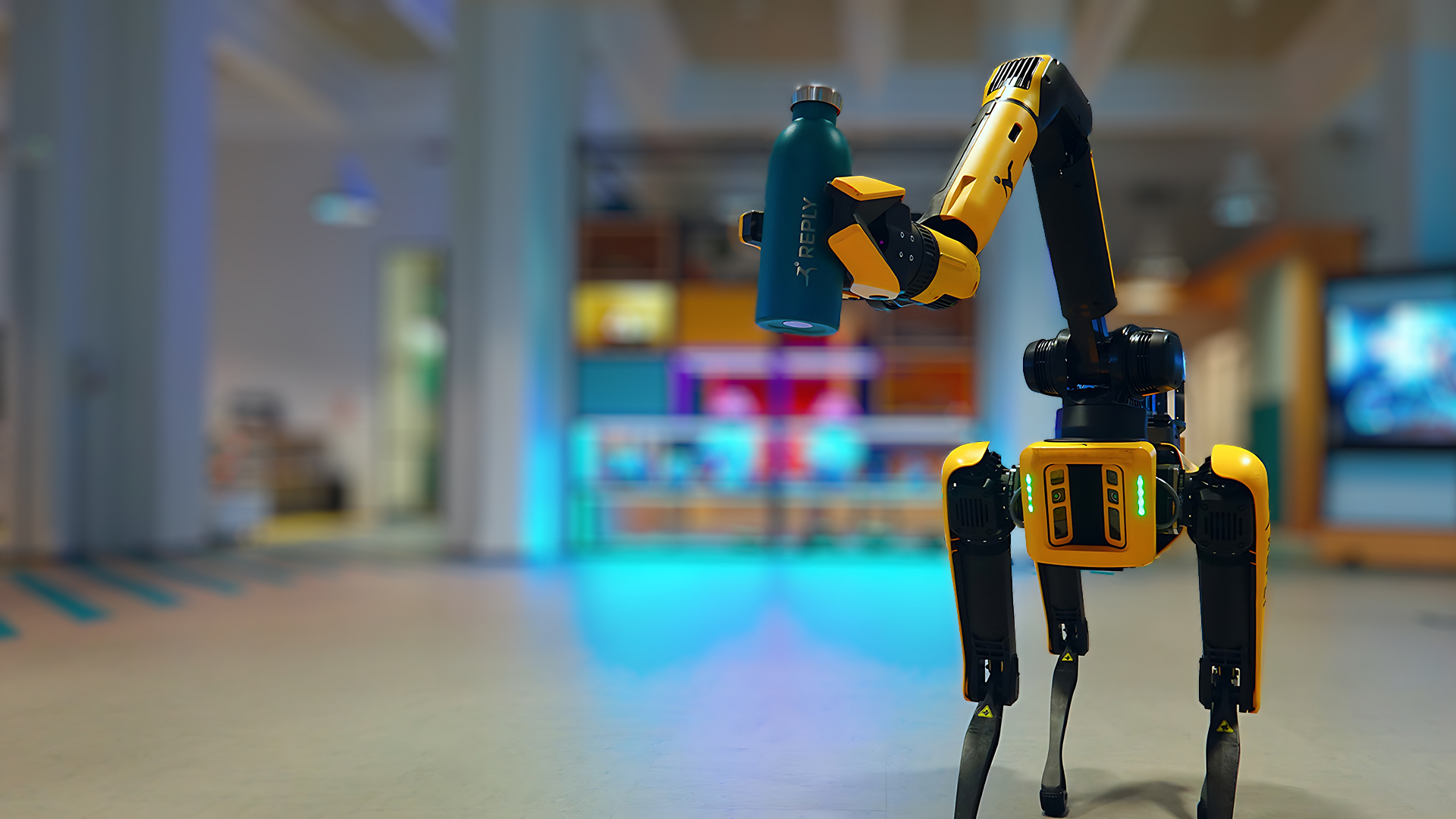Reply is at the forefront of creating humanoid robots that seamlessly function in human-centered environments, combining advanced hardware and custom software based on ROS 2.
WE BELIEVE
It's not about simply having a vision; it's the ability to make your vision into reality that will move your business ahead.
Innovation is no accident. Your tomorrow can only be as great as the vision you have today.
You can do more than looking forward. The best way to predict the future is to create it.
Don't just tell your visions, make them. Words may inspire, but it is by doing that you will show the true potential.
Don’t make it one day; make it day one. The only impossible revolution is the one that never begins.
WE MAKE
Bringing innovation across all industries
;Resize,width=1660)
)
Puma accelerates logistics innovation with GaliLEA
The collaboration between Puma and Logistics Reply evolves the Warehouse Management System (WMS) and improves the user experience in daily logistics activities.
,allowExpansion;Resize,width=660)
)
Journey to low-code
,allowExpansion;Resize,width=660)
Meet Rose, the Digital Human
,allowExpansion;Resize,width=660)
Reply Labs
;Resize,width=660)
Enhancing Cloud Services of an Oil & Gas company
A program for a multinational Oil & Gas company, based on defining a new Cloud Operating Model, to improve key elements from the customer’s existing Cloud Platform.
,allowExpansion;Resize,width=660)
Say “Hello!” to digital humans
;Resize,width=660)
Wealth Management observatory | Q3 2025
As of September 30 of 2025 there has been an increase in AUM of approximately €98 billion compared to the figure recorded in Q3 2024 (+11%). Find out more in the extract from e*finance Wealth Management Reply's Quantitative Observatory.
,allowExpansion;Resize,width=660)
Global bank cloud migration programme
How we set up the framework for the bank’s rapid and game-changing move to public cloud, while also establishing new ways of working and new architectural and security principles.
;Resize,width=660)
Pervasive Security: a new way of thinking
The Pervasive Security paradigm, created by Reply experts, is a new approach to cybersecurity that integrates seamlessly with modern strategies for digital services implementation.
,allowExpansion;Resize,width=660)
"Please don't buy", change the way you dress
Please Don't Buy is a Twinset initiative that promotes the rental of clothes directly from the manufacturer. Retail Reply has designed an online and in-store experience, guiding the client through every step of the project.
,allowExpansion)
,allowExpansion;Resize,width=660)
,allowExpansion;Resize,width=660)
)
)
)
;Resize,width=660)
)
,allowExpansion;Resize,width=660)
)
,allowExpansion;Resize,width=660)
)
,allowExpansion;Resize,width=660)
)
,allowExpansion;Resize,width=660)
,allowExpansion;Resize,width=660)
)
,allowExpansion;Resize,width=660)
)
,allowExpansion;Resize,width=660)
)
,allowExpansion;Resize,width=660)
)
,allowExpansion;Resize,width=660)
,allowExpansion)
)
,allowExpansion;Resize,width=660)
,allowExpansion;Resize,width=660)
,allowExpansion;Resize,width=660)
;Resize,width=660)
,allowExpansion;Resize,width=660)
,allowExpansion;Resize,width=660)
,allowExpansion;Resize,width=660)
;Resize,width=660)
,allowExpansion;Resize,width=1660)
,allowExpansion;Resize,width=660)
,allowExpansion;Resize,width=660)
)
,allowExpansion;Resize,width=660)
;Resize,width=660)
)
,allowExpansion;Resize,width=660)
)
,allowExpansion;Resize,width=660)
,allowExpansion;Resize,width=660)
)
;Resize,width=660)
)
,allowExpansion;Resize,width=660)
)
,allowExpansion;Resize,width=660)
)
;Resize,width=660)
,allowExpansion;Resize,width=660)
)
,allowExpansion;Resize,width=660)
,allowExpansion;Resize,width=660)
)
,allowExpansion;Resize,width=660)
)
;Resize,width=660)
)
,allowExpansion;Resize,width=660)
)
,allowExpansion;Resize,width=660)
)
;Resize,width=660)
,allowExpansion;Resize,width=660)
)
,allowExpansion;Resize,width=660)
)
,allowExpansion;Resize,width=660)
,allowExpansion;Resize,width=660)
)
;Resize,width=660)
,allowExpansion;Resize,width=660)
)
,allowExpansion;Resize,width=660)
)
;Resize,width=660)
;Resize,width=660)
,allowExpansion;Resize,width=660)
)
,allowExpansion;Resize,width=660)
)
,allowExpansion;Resize,width=660)
)
,allowExpansion;Resize,width=660)
)
,allowExpansion;Resize,width=660)
,allowExpansion;Resize,width=660)
)
,allowExpansion;Resize,width=660)
)
,allowExpansion;Resize,width=660)
)
,allowExpansion;Resize,width=660)
,allowExpansion;Resize,width=660)
,allowExpansion;Resize,width=660)
)
,allowExpansion;Resize,width=660)
)
,allowExpansion;Resize,width=660)
)
,allowExpansion;Resize,width=660)
,allowExpansion;Resize,width=660)
,allowExpansion;Resize,width=660)
,allowExpansion;Resize,width=660)
)
,allowExpansion;Resize,width=660)
)
,allowExpansion;Resize,width=660)
)